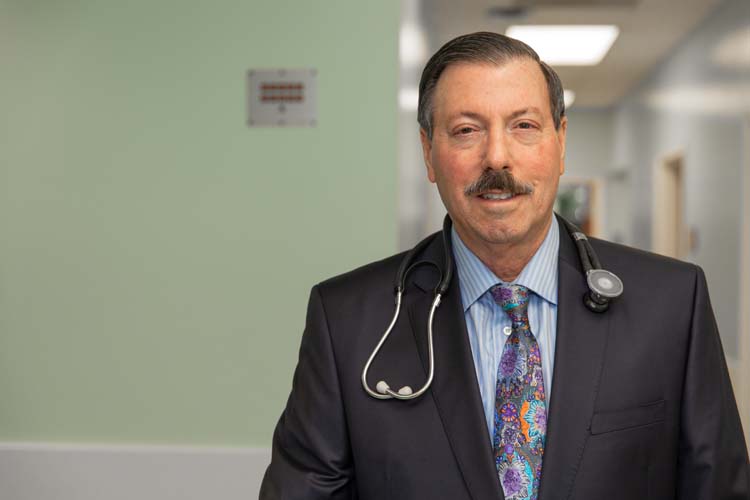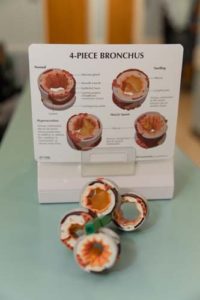
Asthma, according to Dr. Charles Fischman of the Steward Medical Group in Vero Beach, “is one of the few disease entities in the United States now that is on the increase,” which is not good news.
The Centers for Disease Control and Prevention says upwards of 26 million Americans currently have this disease, and admits “we don’t know why” the number of cases are climbing.

Asthmatic airways
Fischman, who describes himself as “one of a handful of living pulmonary immunologists who have done both pulmonary, and allergy and immunology fellowships and are board-certified in both areas,” concurs.
“We think it is probably environmental,” Fischman says, “possibly sick buildings, possibly pollution, possibly urban sprawl causing higher pollen counts, but we don’t really know.”
Pausing only briefly, he adds that “between 5 and 7 percent of all people living in the United States have some form of bronchial asthma and we expect that to increase by 20 to 50 percent over the next 20 years.”
While the National Heart, Lung and Blood Institute calls asthma “a chronic lung disease that inflames and narrows the airways, causing recurring periods of wheezing, chest tightness, shortness of breath and coughing,” Fischman is quick to point out it’s not nearly that simple.
“The important thing with bronchial asthma,” explains Fischman, “is that asthma is an inflammatory disorder of the lung. It causes excessive mucus in the lung and then predominately reversible airway obstruction. Asthma by definition, at least in the early stages, is a reversible illness,” but as the disease progresses, its symptoms, treatments and outcomes can vary tremendously.
“Most lay people,” Fischman continues, “think asthma is a spasm of an airway. You take two puffs of an asthma inhaler and it goes away,” and for what Fischman calls ‘intermittent asthma’ that’s largely true.
But “persistent asthma” or “severe persistent asthma” is a whole other story. These affect less than 10 percent of all asthmatics but require far more than an inhaled corticosteroid to treat.
In this country alone, says the professorial Fischman, “persistent asthma is responsible for over 15 million out-patient visits per year and over $10 billion of emergency room costs.”
What’s more, “over 5,000 people in the United States die every year from bronchial asthma and the majority of those deaths would be preventable with appropriate treatment.”
It’s here where Fischman points to some good news: the advent of treatment using monoclonal antibodies or “biologics.”
Biologics approach diseases at the cellular level. “Their proteins,” Fischman explains, “attach to specific molecules and cells in the body. You inject them and they attach. In addition to destroying whatever [harmful cells] they attach to on their own, you can link them to drugs and toxins which can help them destroy whatever you’re looking to kill.”
“If you understand what a monoclonal antibody is and you understand how they work, you basically understand everything that’s about to happen in the next 20 years. This is the future of medicine.”
To bolster his claim, Fischman uses this anecdote: “Pfizer,” he says, “which is one of the biggest drug companies in the world, fired all 10,000 of their chemists. Do you know why? Because they don’t want to make chemical drugs anymore, like Lipitor. What they’re looking to produce is only biologics.
We now have biologics that treat cholesterol, we have biologics that treat rheumatoid arthritis, Crohn’s disease, ulcerative colitis, bronchial asthma, there’s even now a biologic for migraine headaches.”
Fischman mentions three biologics that are being used to successfully treat persistent asthma: Xolair, Nucala and Fasenra.
He says the drugs are making thousands of lives significantly better, but they come at a price. A steep price.
Xolair can cost as much as $20,000 a year. Even with various pharmaceutical company programs and insurance, the out-of-pocket cost still runs somewhere around the $200-to-$400 per month level.
Fasenra and Nucala can be even pricier at $15,000 to $35,000 a year.
As much teacher as physician, Fischman uses a battery of diagrams and visual aides to walk his patients through the cause-and-effect reactions these biologics will have on them and their disease.
Dr. Charles Fischman is with the Steward Medical Group. His office is at 1600 36th Street, Suite C in Vero Beach. The phone number is 772-569-6112.



